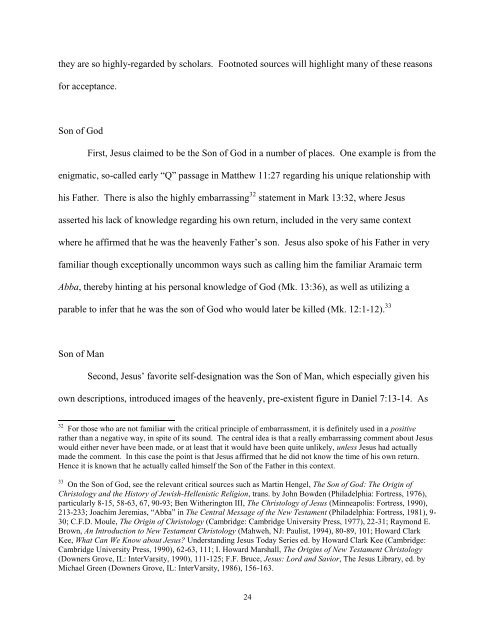Published by
299z7CN
299z7CN
Create successful ePaper yourself
Turn your PDF publications into a flip-book with our unique Google optimized e-Paper software.
they are so highly-regarded <strong>by</strong> scholars. Footnoted sources will highlight many of these reasons<br />
for acceptance.<br />
Son of God<br />
First, Jesus claimed to be the Son of God in a number of places. One example is from the<br />
enigmatic, so-called early “Q” passage in Matthew 11:27 regarding his unique relationship with<br />
his Father. There is also the highly embarrassing 32 statement in Mark 13:32, where Jesus<br />
asserted his lack of knowledge regarding his own return, included in the very same context<br />
where he affirmed that he was the heavenly Father’s son. Jesus also spoke of his Father in very<br />
familiar though exceptionally uncommon ways such as calling him the familiar Aramaic term<br />
Abba, there<strong>by</strong> hinting at his personal knowledge of God (Mk. 13:36), as well as utilizing a<br />
parable to infer that he was the son of God who would later be killed (Mk. 12:1-12). 33<br />
Son of Man<br />
Second, Jesus’ favorite self-designation was the Son of Man, which especially given his<br />
own descriptions, introduced images of the heavenly, pre-existent figure in Daniel 7:13-14. As<br />
32 For those who are not familiar with the critical principle of embarrassment, it is definitely used in a positive<br />
rather than a negative way, in spite of its sound. The central idea is that a really embarrassing comment about Jesus<br />
would either never have been made, or at least that it would have been quite unlikely, unless Jesus had actually<br />
made the comment. In this case the point is that Jesus affirmed that he did not know the time of his own return.<br />
Hence it is known that he actually called himself the Son of the Father in this context.<br />
33 On the Son of God, see the relevant critical sources such as Martin Hengel, The Son of God: The Origin of<br />
Christology and the History of Jewish-Hellenistic Religion, trans. <strong>by</strong> John Bowden (Philadelphia: Fortress, 1976),<br />
particularly 8-15, 58-63, 67, 90-93; Ben Witherington III, The Christology of Jesus (Minneapolis: Fortress, 1990),<br />
213-233; Joachim Jeremias, “Abba” in The Central Message of the New Testament (Philadelphia: Fortress, 1981), 9-<br />
30; C.F.D. Moule, The Origin of Christology (Cambridge: Cambridge University Press, 1977), 22-31; Raymond E.<br />
Brown, An Introduction to New Testament Christology (Mahweh, NJ: Paulist, 1994), 80-89, 101; Howard Clark<br />
Kee, What Can We Know about Jesus? Understanding Jesus Today Series ed. <strong>by</strong> Howard Clark Kee (Cambridge:<br />
Cambridge University Press, 1990), 62-63, 111; I. Howard Marshall, The Origins of New Testament Christology<br />
(Downers Grove, IL: InterVarsity, 1990), 111-125; F.F. Bruce, Jesus: Lord and Savior, The Jesus Library, ed. <strong>by</strong><br />
Michael Green (Downers Grove, IL: InterVarsity, 1986), 156-163.<br />
24


